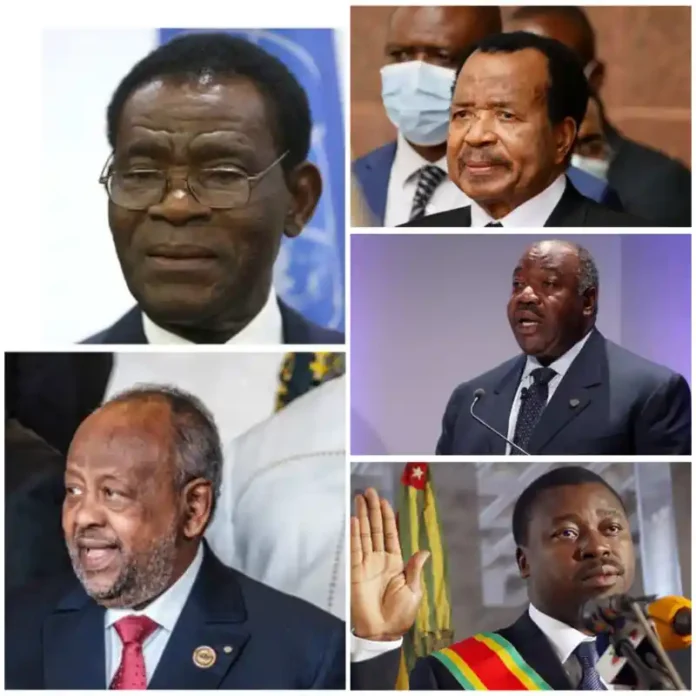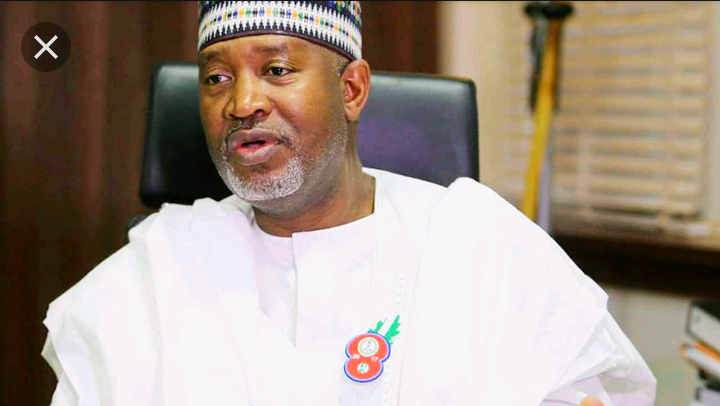In Africa, certain leaders have maintained their hold on power for more than three decades, exceeding 30 years in office.
Some heads of state persist in their positions despite advancing age, refusing to relinquish power to new leaders.
These long-serving presidents often justify their continued governance by claiming it is the will of their citizens.
Nevertheless, this extensive article provides a compilation of the present longest-serving African heads of state.
African Leaders Clinging to Power: Few Civilian Regimes Approved by Multilateral and Regional Institutions
In many African nations, a concerning trend persists as numerous leaders manage to cling to power for decades through various means, including the use of force, breaking laws, or bending constitutions. This deeply entrenched norm has become a recurring practice throughout the modern history of the continent.
While there have been instances in the past where certain presidents were ousted from power, a select few have managed to maintain their positions, prompting concern and scrutiny from the international community. Despite the criticisms and controversies surrounding African leadership, some civilian regimes have garnered approval from multilateral and regional institutions for their governance.
1.Togo President, Faure Gnassingbé
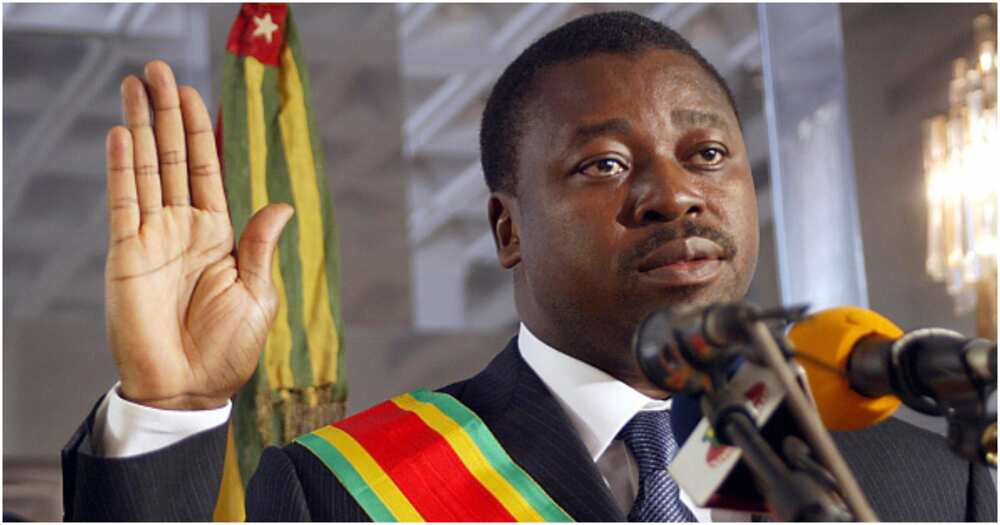
Source: Getty Images
Title: Faure Gnassingbé’s Leadership: A Continuation of Progress and Economic Growth in Togo
Faure Gnassingbé has been at the helm of Togo’s presidency since 2005, following in the footsteps of his late father, Gnassingbé Eyadéma, who seized power in 1967 and ruled for 38 years. Throughout his tenure, President Faure Gnassingbé has prioritized national reconciliation and fostered a peaceful political climate in the Togolese Republic.
Under President Gnassingbé’s leadership, Togo’s economy has experienced a noticeable growth increase, and the nation has embarked on an active phase of modernization. Bold policies implemented by the government have played a significant role in driving economic development and progress within the country.
During his four terms in office, President Gnassingbé’s commitment to steering Togo towards prosperity has been evident. The emphasis on economic growth and modernization has opened up new opportunities for Togolese citizens and contributed to the overall improvement of living standards.
Read Also US Court Gives Verdict on Atiku’s Suit Seeking Tinubu’s Academic Records
In addition to economic advancements, the President’s efforts towards national reconciliation have aimed to heal historical divisions and promote unity among Togo’s diverse population. By fostering a peaceful political environment, President Gnassingbé has sought to strengthen social cohesion and ensure the well-being of all citizens.
However, the prolonged rule of the Gnassingbé family has also faced criticism from some quarters, with concerns raised over issues related to governance, human rights, and political pluralism. As Togo moves forward, it is essential for the government to address these concerns and work towards a more inclusive and participatory democracy.
2. President of Gabon, Ali Bongo
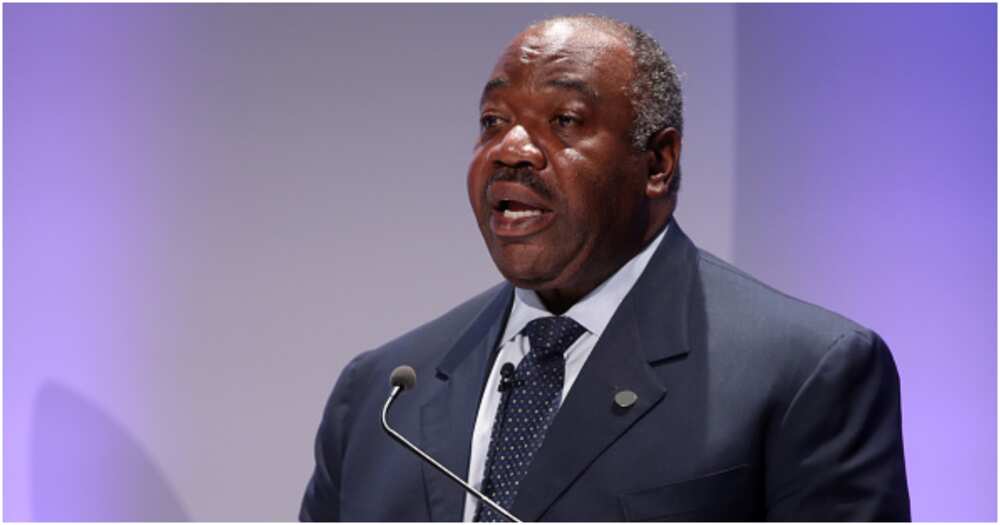
Source: Getty Images
In the heart of Gabon, Libreville, Ali Bongo assumes the role of the country’s president, but his leadership evokes contrasting perceptions. To some, he is seen as a privileged, playboy prince, who views ruling the oil-rich nation as his birthright, continuing his family’s 50-year reign from the shadows of a former funk singer. Yet, there are others who view Bongo as a reformer, asserting that he was democratically elected by the masses.
Amid this dynamic, on 7 January, a group of soldiers attempted to seize control of the nation, citing a mission to “restore democracy” following the controversial 2016 election. During this election, Bongo narrowly secured victory amid accusations of fraud and violent acts. The incident showcased the deep divisions surrounding his leadership.
Having succeeded his father, who governed for an extensive 42-year period, Ali Bongo inherits a legacy that carries both praise and scrutiny. While some credit him for implementing reforms and striving for positive change, others remain critical of the concentration of power within his family’s rule and the need for more transparent and accountable governance.
Pay attention to Senate Issues Fresh Ultimatum to President Tinubu to Act Swiftly on Appointment
In the midst of these complexities, Gabon stands at a crossroads where the demand for democracy and political stability intertwines with the quest for economic development and social progress. As Bongo’s term continues, the president faces the challenge of addressing these multifaceted issues to create a more inclusive and prosperous future for the nation and its citizens. The balance between preserving tradition and embracing necessary reforms will define the course of Gabon’s trajectory under his leadership.
3. President of Cameroon, Paul Biya, (41-year rule)
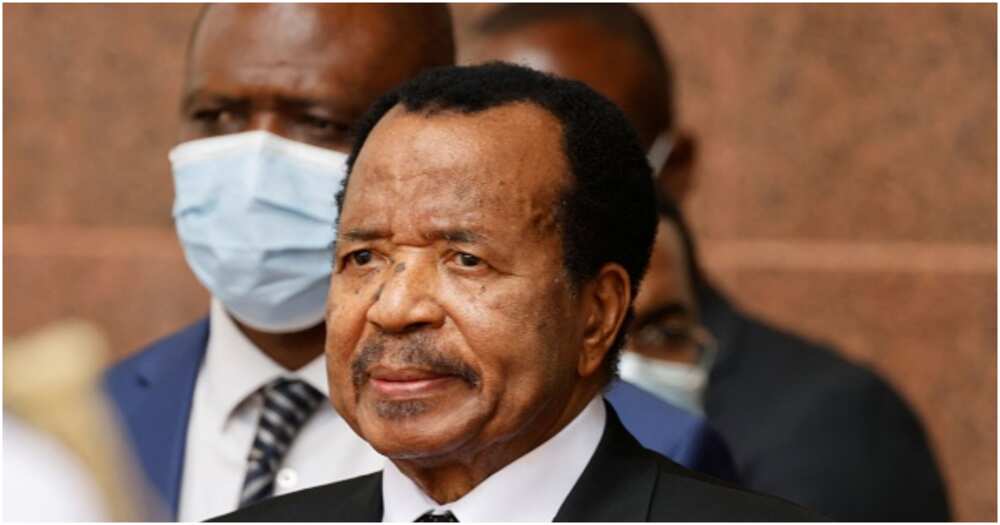
Source: Getty Images
Paul Biya’s 41-Year Presidency: A Long-Standing Figure in Cameroon’s Political Landscape
Paul Biya, the current president of Cameroon, has held the civilian presidency for an impressive 41 years, making him one of the longest-serving leaders in African history. His political journey began when he served as prime minister for seven years before ascending to the highest office in the country.
Born on February 13, 1933, in Mvomeka’a, Meyomessala Subdivision, Dja-et-Lobo Division, South Region, Biya is the son of Etienne Mvondo Assam and Anastasie Eyenga Elle. His upbringing and experiences have shaped his leadership style and approach to governance.
Biya succeeded Ahmadou Ahidjo, becoming Cameroon’s second Head of State on November 6, 1982, after President Ahidjo’s resignation on November 4. Throughout his lengthy tenure, Biya has navigated a range of challenges and transformations in Cameroon’s political landscape.
As a prominent figure in Cameroon’s history, Biya’s leadership has been marked by both accomplishments and criticisms. While some praise his ability to maintain stability and economic growth, others raise concerns about issues related to political freedom, human rights, and governance.
With such a prolonged period in power, the call for political reform and the need for a more inclusive political environment have intensified. As Cameroon continues to evolve, the nation faces the task of balancing its historical continuity with the aspirations of its citizens for a more democratic and participatory system.
As Paul Biya continues to steer Cameroon’s destiny, the nation’s future will inevitably be shaped by his vision and leadership, as well as the aspirations of its people for a prosperous and united Cameroon.
4. Teodoro Obiang Nguema Mbasogo (44 year rule) – Equatorial Guinea
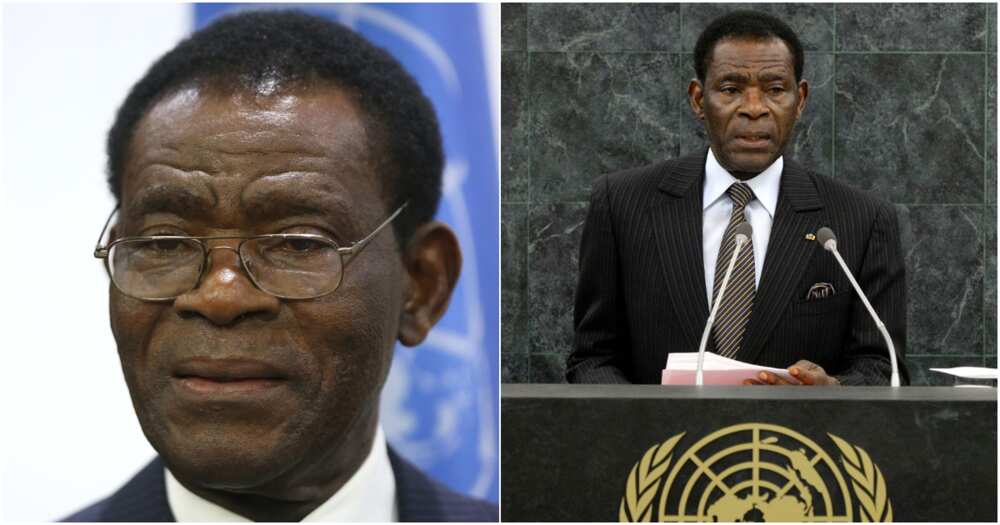
Source: Facebook
Theodore Obiang Nguema: Africa’s Longest-Serving President and Equatorial Guinea’s Family Dynasty
Theodore Obiang Nguema, born on June 5th, 1942, holds a remarkable position as Equatorial Guinea’s civilian leader for an astonishing 44 years. In 1979, he took power through a military takeover, seizing control of the oil-rich West African nation from his uncle, Francisco Macias Nguema, who ruled with an iron fist.
After gaining office, President Obiang initiated some reforms but maintained the absolute control established by his predecessor, continuing the nation’s history of centralized authority. This power concentration has led to a system that some describe as a family dynasty, as President Obiang’s rule has persisted since August 3, 1979.
Now 81 years old, President Obiang possesses the constitutional authority to rule by decree, granting him significant decision-making power. Despite facing over a dozen coup attempts, he has managed to retain his grip on power, earning the distinction of being both Africa’s and the world’s longest-serving president.
The continuity of leadership in the Obiang family extends further as President Obiang’s son, Teodoro Nguema Obiang Mangue, holds the position of vice president of Equatorial Guinea. This familial connection has sparked debates about political succession and the consolidation of power within the ruling family.
Throughout his lengthy rule, President Obiang’s leadership has been marked by both praise for economic development and criticism regarding human rights issues and political freedom. The persistence of one family’s leadership over such a prolonged period has ignited discussions about the need for political reform and a more inclusive political landscape in Equatorial Guinea.
As the nation looks to the future, questions about the path of succession and the potential for broader political participation will shape the course of Equatorial Guinea’s political development. The delicate balance between maintaining stability and addressing calls for change will continue to be a central challenge for the nation and its leadership.
5. President of Djibouti, Ismaïl Omar Guelleh,
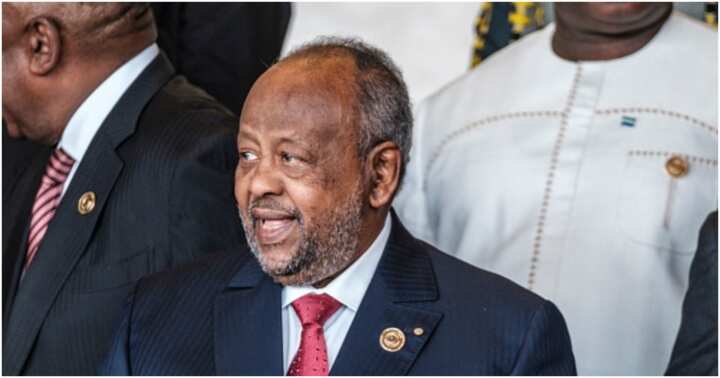
Omar Guelleh: Djibouti’s Long-Standing Civilian Leader and Legacy Succession
Omar Guelleh is the current president of the Republic of Djibouti, having served as a civilian leader for the past 24 years. His rise to power came in 1999 when he took over from his uncle, Hassan Gouled Aptidon, who was Djibouti’s first President and Prime Minister, ruling from 1977 to 1999.
In April 2021, President Guelleh secured his 5th term in office with an overwhelming victory, obtaining over 98% of the votes in the re-election. His continued success at the polls reflects his significant popularity and influence within the country’s political landscape.
During his time in power, President Guelleh’s leadership has seen Djibouti experience various developments and changes. While some praise his role in fostering stability and economic progress, others raise concerns about political pluralism and the need for greater political participation.
The legacy of succession within President Guelleh’s family, passing down the mantle from his uncle, highlights Djibouti’s unique political history. As the nation moves forward, the question of political reform and the transition of power beyond family lines may become crucial for ensuring a more inclusive and representative governance structure.
President Omar Guelleh’s continued leadership will undoubtedly shape Djibouti’s future trajectory, as the nation navigates between its historical legacy and the aspirations of its citizens for a more democratic and prosperous future. The balance between continuity and reform will play a critical role in shaping the country’s political landscape for the years to come.
Tensions Rise as Niger Republic Severs Ties with Nigeria and Other Nations
In a recent development, the junta in Niger Republic has taken a significant step by cutting off ties with Nigeria, among other nations. Efforts by the Economic Community of West African States (ECOWAS) to resolve the ongoing impasse have reportedly failed, leading to the escalation of the situation.
A delegation led by General Abdulsalami Abubakar (rtd) from Nigeria engaged in discussions with representatives of the junta on Thursday, August 4. However, the talks did not result in a resolution, prompting Niger to sever ties not only with Nigeria but also with Togo, France (its colonizer), and the United States.
The decision to cut off diplomatic ties indicates a heightened state of tensions and highlights the complexities of the political situation in Niger. As the situation continues to unfold, regional and international efforts may play a crucial role in finding a peaceful and diplomatic resolution to the impasse.
The consequences of this decision and its impact on the broader region will likely be closely monitored by the international community in the days to come. Diplomatic channels and dialogue may be crucial in addressing the issues and restoring stability in the region.
Niger’s Ousted President Mohamed Bazoum Appeals for International Support and Constitutional Order
In the aftermath of the coup that ousted him from power, former Nigerien President Mohamed Bazoum has reached out to the United States and the international community, calling for their assistance in restoring constitutional order in the Republic of Niger. In an opinion article published in the Washington Post, Bazoum expressed his concerns and urged for action to address the current political crisis.
The ousted President emphasized that he was writing the article while being held as a hostage, indicating the tense and precarious situation he finds himself in. His appeal for support from the international community reflects the urgency of the matter and the potential consequences if the situation remains unresolved.
President Bazoum also raised a cautionary note about the potential influence of Russia through the Wagner Group in the region. The presence of this private military company operating in neighboring countries poses a significant concern for the stability and security of the region.
The call for international assistance and concern about external influence highlights the complexity of the political situation in Niger and its potential impact on regional stability. As the international community assesses the situation, diplomatic efforts and regional cooperation may be critical in finding a peaceful and constructive resolution to the crisis.
The coming days will likely be crucial in determining the course of events in Niger, and international responses may play a vital role in shaping the outcome and restoring constitutional order in the country.

